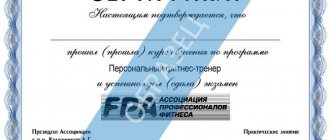- a project for everyone who strives to learn, gain new knowledge and develop their abilities, as well as for those who are ready to pass on their knowledge to others.
Masters of their craft, experts in their field (trainers, instructors, coaches, gurus, tutors, teachers) will talk about themselves and their training programs.
Those who are looking for an opportunity to learn something new will be able to choose the optimal teacher for themselves by comparing the offers of different trainers. The “Trainers” section contains advertisements for private trainers, instructors and tutors offering various types of training. In the “Community” section you can view a list of all trainers.
We are sure that for many people, our project will become a starting point for development and growth!
[td]
Are you looking for a trainer or instructor?
You can:
- Determine the main areas in which you want to develop, make a personal list of skills that you want to master.
- Find training offers you are interested in in the catalog of trainer advertisements
- Search for coaches, tutors and instructors by name and city
- Communicate with various specialists before making the final choice of a trainer (tutor, instructor) and training program
[/td]
Personal trainers for any sport
The MOSTREANNER portal has combined information on its pages about all trainers of any specialization working in Moscow.
Thanks to a simple search, in a matter of seconds you will select a professional who will lead you to the heights of beauty, health and skill. You can also safely call us by phone, leave requests for the selection of a coach - we will definitely help! All our services for students (consultations, selection of a coach) are free. The lessons themselves are paid directly to the trainer, without commission.
Personal training is good because the trainer's full attention will be focused on you. He will not only show you the correct movements and check how accurately you perform them, but will also develop a training program, select the best diet, in a word, do everything necessary to ensure that you quickly achieve the desired result.
you find a personal trainer in your area. Please also note that many professionals provide such a service as home visits. Playing sports will be as enjoyable and useful as possible with a trainer at home!
We invite trainers of any specialization to cooperate! Posting on the site is free. You only pay for those you start training with. Register now.
We guarantee excellent advertising throughout the entire duration of your placement . Advertising support is constantly increasing and will eventually remain at the highest level.
Choosing a trainer for corporate training in 4 steps
Step #1: IDENTIFY CRITERIA
The first thing the training customer must do is:
1) define for yourself the purpose and objectives of this training as clearly as possible;
2) identify criteria for trusting a coach.
Choosing a trainer for corporate training Suppose the customer has decided on the first point (this is the topic of a separate article), what to do with the second? Which coach can you trust and which can't?
Trust criteria can be divided into general and special. The general ones will be the professional and personal qualities of the trainer you prefer, and the special ones will be the characteristics that correspond to the intended objectives of the training.
As for the general criteria, everything is quite clear here, you yourself determine the importance of certain qualities, as a rule, this is quite individual. The special characteristics should be clarified a little.
For example, conducting a ropes course may not require a higher education, which cannot be said about human resource management training for senior managers. Or, a young, energetic coach would be suitable for training in a youth team, but he is unlikely to be suitable for a team with an average age of 45–50 years, where the age difference can become a significant obstacle to the perception of information. And finally, if you are doing training, for example, on business etiquette, then it will be impossible to have a trainer who does not comply with this etiquette.
So, the best solution would be to compile a list of such criteria that you can use to guide your further selection of a coach.
Step #2: PRELIMINARY ASSESSMENT
You have made a list, now your task is to find a coach. There are many options: searching on your own, contacting specialists, following recommendations, and so on... The result of the search will be an interview with a trainer, but even before that you can significantly reduce the number of candidates.
Before you proceed to the interview, conduct a preliminary assessment of the trainer to find out his primary competencies, namely:
Find out information about his education, availability of special training in the field of training and completed projects; review customer recommendations and reviews from participants in his trainings; ask for as detailed a program of the proposed training as possible; Find out more information about the coach’s personality and his professional approach on his website or from his social media pages. Special training in the field of training (for example, “training of trainers”) shows that a person is not just a specialist in a narrow field, but a trainer, which means that your employees will practice practical skills and not sleep through lectures or seminars. The presence of completed projects, that is, successfully conducted trainings, speaks about the candidate’s experience.
Pay attention to the availability of reviews and recommendations; their absence significantly increases the risk of poor-quality training. The lack of a clear program, in most cases, is also a sign of the coach’s incompetence.
Evaluate the information received against your list of criteria for trusting a coach and decide whether such a candidate is suitable for you.
With this preliminary assessment you will save time and, in most cases, you will be able to invite an existing candidate for an interview to conduct training in your company.
Step #3: INTERVIEW
Choosing a trainer for corporate training Finally, you have a live candidate in front of you and an excellent opportunity to evaluate the trainer on most characteristics. At this stage, you will not look at it except in action, but you will receive confirmation or refutation of your preliminary opinion.
What to look for?
First, trust your feelings. Decide what impression the coach makes on you personally. Consider the impression it will make on your employees. Do you trust him? Will employees trust him? To what extent does he come across as a professional from whom you want to learn?
Secondly, pay attention to the coach’s communication skills. Does he speak confidently? Does he hide his eyes or look openly? How clearly does he express his thoughts? How calm are you? Pay attention to nonverbal manifestations: facial expressions and gestures, they often reveal what a person would like to hide. The coach must radiate confidence and calm, otherwise it will be extremely difficult for him to find productive contact with the group.
Third, evaluate the trainer’s ability to present and explain his program. Confused and inconsistent speech will indicate either poor oratory skills or insufficient knowledge of the subject. A clear and accessible presentation of thoughts, decorated with clear examples and explanations, on the contrary, will indicate his professional skill.
Fourth, don't be shy to ask questions. Questions of absolutely any kind, both related to the subject and not related. You need to see the candidate's level of self-control, his ability to answer difficult questions, manage the situation and remain calm.
Fifthly, try to find out his professional competence. After all, what is written on paper is one thing, and real compliance is another. Here it is also necessary to ask questions aimed at identifying
1) his subject knowledge (management, sales, presentations, etc.)
2) his competencies as a coach (ability to respond to difficult situations, work with difficult participants, knowledge of methods for presenting and conveying material).
Having determined the level of trust in the coach and correlating his characteristics with your list of criteria, you can already decide on the suitability of the candidate.K
The memo is sent by e-mail and contains specific recommendations on what traits need to be checked when selecting a coach, and what questions should be asked.
Step #4: ASSESSMENT IN CASE
However, if you are still tormented by doubts, you can watch the coach in action. Here again you have several options. You can ask the trainer for a video of working with the group. Or you can arrange a short presentation of his training for your employees, visit a work-shop or open training.
Your main task at this stage is to see how the coach manifests himself in reality when working with the group. Also pay attention to:
1) Relevance and compliance of the information provided with the stated topic of the training;
2) Professional orientation of the trainer in the subject and illustrating the material with specific examples;
3) The presence of exercises, and not just lecture material;
4) The degree of benevolence and respect of the trainer for the group;
5) The degree of trust and respect of the group to the coach;
6) Professional approach, variety of teaching tools and adequacy of their application.
7) Trainer's observance of courtesy, ethical behavior and respect for social norms of behavior and corporate values of your company.
***
Using even some of these recommendations will significantly increase your chances of hiring the specialist you need. Remember, an irresponsible approach to choosing a coach may not only not bring any positive results, but also cause negative consequences. Therefore, focus on the training objectives, choose a trainer in accordance with your criteria, conduct a preliminary assessment, trust your impressions and get professional trainers and the desired result!
Author: Olga Paratnova, Chief Editor of the portal for trainers and HR https://trenerskaya.ru/
Rate the fitness trainer's appearance
Appearance plays an important role in choosing the right instructor.
Of course, a professional in the world of athletics must look impressive himself - captivating with sculpted muscles and a neat appearance.
However, a trainer “as in the picture” is not the best selection criterion. A beautiful body is not at all a guarantee of deep knowledge of human anatomy and physiology.
In addition, there is no guarantee that he did it without the use of pharmacology.
Therefore, first of all, pay attention to his clients. And ideally, get to know them and clarify all your questions.
How long have they been studying with the fitness instructor you liked, what problems did they address to him and what successes did they achieve under his leadership?
Practice shows that clients will tell a lot more about a trainer than he does about himself.
First, let's look at a small case:
- Imagine that you are the general manager of a hotel. You went back to work after a short vacation, and right from the morning on your first day, events rained down on you. Entering the hotel lobby, you saw a crowd of guests standing in line at the cloakroom and indignantly discussing the absence of a cloakroom attendant.
The wardrobe does not work, because the beginning of autumn is considered a warm season. But just this morning it started to rain, and everyone came in raincoats. The level of your hotel does not allow the existence of queues. You see that the cleaning has not been done, there are dirty bins and ashtrays in the hotel lobby, and the night maids are nowhere to be seen.
One of your managers runs to you and tells you that the guests accused the hotel of stealing wedding gifts. A story about this case has already been published on TV, and therefore three major clients canceled their events in the morning. What further damage there will be is unknown. On top of that, you see that police are heading towards you, who obviously want to question you about this situation.
Even if you are not the general manager of a hotel, there have probably been situations similar to this in your life.
Situations when it is necessary to make many decisions at once. When many problems arise that require immediate solutions. When some difficulties are typical, but others take a long time to deal with.
Provide feedback
Feedback is extremely important when communicating with a coach.
Therefore, try to be as frank as possible with your instructor.
Tell him about what you want to achieve, pay attention to the exercises that you don’t like, and frankly admit if you violated the regime.
It is important to understand here that even a well-thought-out individual program is still just a guess.
It may need to be adjusted depending on your state of health and well-being.
And without full feedback, this is impossible.
If, after a month of training, you do not feel this feedback, if you understand that the trainer is only making demands, without listening to your state, it is better to say goodbye to him and find yourself another instructor.
Confusing situations
Confusing situations do not have ready-made and guaranteed correct solutions. Everything is unclear, and it is unknown what might work. Answers can only be obtained after you take a step.
What works in confusing situations:
— Formulation and testing of hypotheses
— Strengthening communications
— Searching for feedback from clients, partners, colleagues
— Involving employees in generating ideas
In a confusing situation, you need to create a solution to a problem that neither you nor those around you have solved before. And then test this solution in practice.
There are 4 classes of situations:
1 - Simple
2 - Difficult
3 - Confused
4 - Chaotic
In addition, there are mixed situations that include signs of all four.
*By the way, “kenevin” means “habitat area” and the author of the concept is British management consultant David Snowden. Why habitat area? Probably because this framework defines a "domain" for every problem we might encounter.
Difficult situations
In complex situations , there may be many possible solutions, and some of them may have negative consequences. You may not have enough knowledge to make a decision; you may need the help of an expert or someone with experience.
What works in difficult situations:
— Consultations with experts
— Discussion with the team
— Detailed analysis of all known facts
— Creating a situation development model and planning different scenarios
A complex situation requires detailed analysis, and only then action. At the same time, it is important not to get stuck in the analysis for a long time, but to move on to active steps in a timely manner.
Chaotic situations
Chaotic situations are even more complex. These are crises that require immediate steps to address the worst consequences. High uncertainty prevents the search for the right solutions, but something needs to be done urgently.
What works in chaotic situations:
— Personal leadership of the first person
- Using any steps that give effect here and now
— Prevention of harm
In chaotic situations, it is necessary to act first, solving the most pressing and pressing problems. And only then - analyze and evaluate the decisions made.
Trainers are invited to cooperate
Many Muscovites and guests of the capital are trying to find a coach, but do not know how to do it. Our portal is designed to “combine” demand with supply. If you are a professional trainer interested in finding new clients, welcome!
Our website will not only help a private trainer find clients, but will also allow you to make their flow constant and inexhaustible.
Why should you register with us? Our portal is in the TOP 10 of search engines such as Yandex, Google, Mail.ru. Paid contextual advertising allows us to be visible to hundreds and thousands of potential students. Banners on sports sites attract hundreds of interested people to our portal. Simply put, you should register with us because it will really help you find new clients.
Please note: seating for trainers is limited. Our website will contain the personal pages of as many masters as we can actually provide with students.
How can the Kenevin Framework help managers?
According to research, one of the sources of stress for managers is the need to solve many problems at different levels.
For example, you need to prepare a presentation to receive an investment of a million dollars. And at the same time, organize the repair of a broken cabinet in the office.
This causes confusion, because the skills for solving a global problem are completely different than for solving a local everyday issue. And switching between such different tasks takes a lot of energy.
To get out of the stupor, you need to classify tasks and approach each category differently.
The Kenevin framework helps with exactly this. A manager who owns this technology knows how to find different approaches to different problems.











